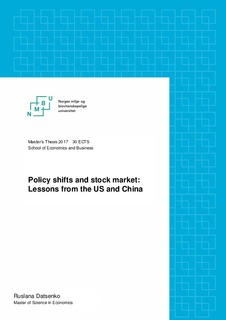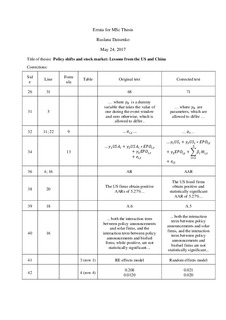| dc.description.abstract | Governments set legal framework and economic policies, which influence the economic-institutional environment in which financial actors operate. They levy taxes, provide subsidies and investments, enforce laws and punish law-breakers, regulate competition, etc. In recent years, many policy initiatives have been launched to stimulate the transition towards renewable energy (RE). The main question of this thesis is how the launching of such initiatives – and other major political events – have influenced stock prices of companies in two sectors (fossil fuel and renewable energy) and in two countries (the US and China). This study is of particular interest for the policymakers and investors in evaluating effectiveness of news about RE policy.
One challenge in measuring the impact of announcements on stock prices is that policy and legislative processes are slow and the news are gradual. Regulatory events usually involve multiple announcements, due to extensive negotiations and public debate. They are more likely to be anticipated compared with corporate announcements. Yet, there are many examples of policy announcement and political events having an impact on stock prices.
During the study I selected three important political events which could potentially shift RE policy and affect performance of energy firms: the 2012 presidential election in the US, the Paris agreement on climate change, and the 2016 presidential election in the US. The results of the study indicate that major political events affect the performance of energy firms.
In addition, the results indicate that news about RE policy positively affect the performance of RE firms, but they do not affect the performance of fossil fuel firms. This indicates that while RE policy encourage investments into RE firms, fossil firms do not perceive RE industry as a substantial competitor. Chinese RE firms are more affected by the news about policy announcements than US firms. This could be of two reasons: first, US political system is more open, thus, RE policy news could be more anticipated than Chinese; second, the US announcements might be less relevant than Chinese, due to heavy reliance of the US central government on state-level policies. | nb_NO |


